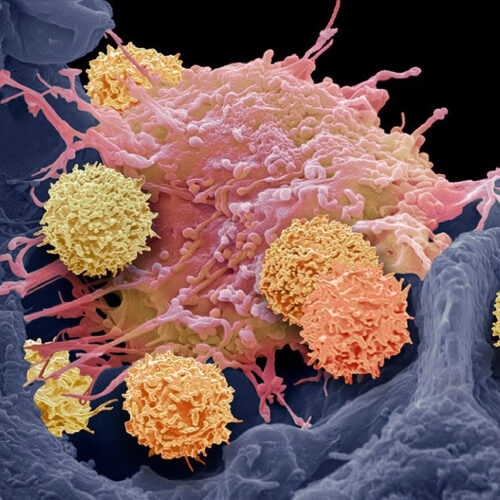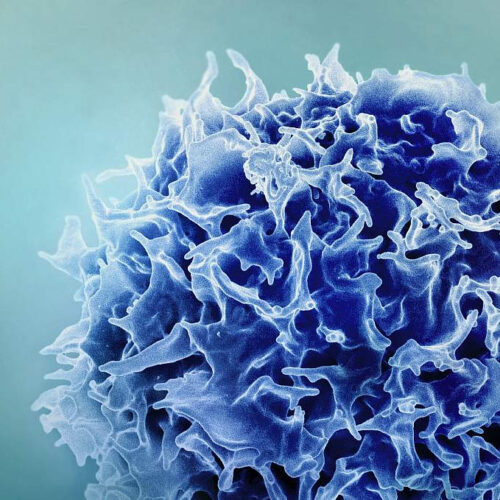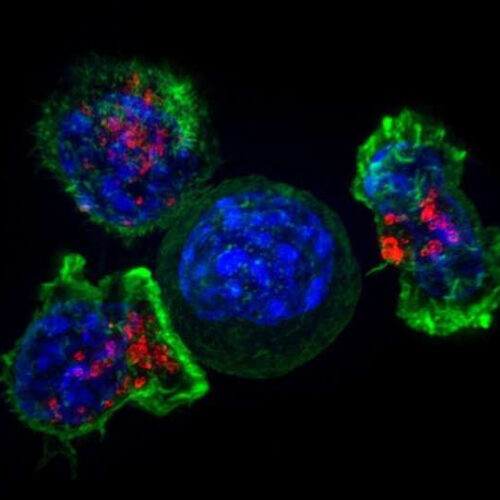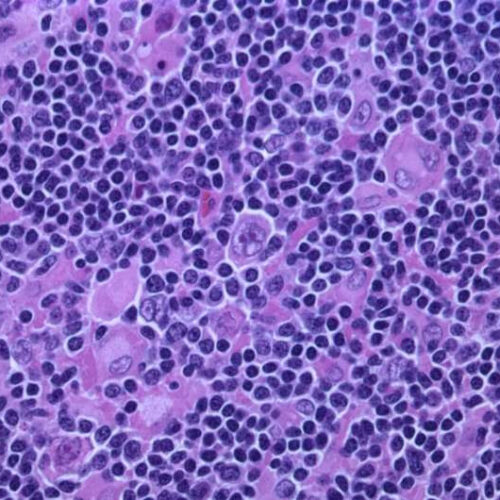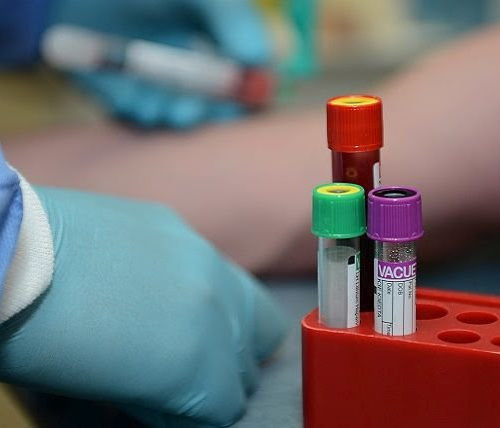Engineered immune cells, most commonly used to treat cancers, show their power against lupus and other immune disorders. Composite coloured scanning electron micrograph (SEM) of T-cells (small round) and a cervical cancer cell (Hela) T cells (smaller cells) can be engineered to recognize cancer cells — and also other immune cells.Credit: Steve Gschmeissner/Science Photo Library...
Tag: <span>CAR-T therapy</span>
Potential treatment for rare autoimmune disorder adapted from CAR-T therapy
Evidence from a small-scale clinical trial suggests that a variation of the advanced blood cancer immunotherapy known as CAR-T could be adapted to treat myasthenia gravis, an autoimmune disorder of the nervous system. The modified CAR-T therapy, short for chimeric antigen receptor T-cell, used by scientists offers the potential for a longer-lasting reduction in myasthenia gravis symptoms and...
Researchers expanding the types of cancer CAR-T therapy can target
by Gregory Allen, The Conversation Killer T cells (green and red), or cytotoxic T cells, surround a cancer cell (blue, center). Credit: NICHD/J. Lippincott-Schwartz, CC BY-NC-ND Teaching the body’s immune cells to recognize and fight cancer is one of the holy grails in medicine. Over the past two decades, researchers have developed new immunotherapy drugs that stimulate...
Researchers present advance in re-treatment with CAR T therapy
by Perelman School of Medicine at the University of Pennsylvania Hodgkin lymphoma, nodular lymphocyte predominant (high-power view) Credit: Gabriel Caponetti, MD./Wikipedia/CC BY-SA 3.0 Researchers from the University of Pennsylvania’s Abramson Cancer Center presented preliminary results of an ongoing Phase I clinical trial demonstrating successful re-treatment with CAR T cell therapy for patients whose cancers relapsed...
Higher doses of CAR-T therapy bring survival advantage for young patients with hard-to-treat B-ALL
AMERICAN SOCIETY OF HEMATOLOGY (WASHINGTON, August 8, 2022) – Young people who received doses of tisagenlecleucel, a chimeric antigen receptor T cell (CAR-T) therapy, at the higher end of the FDA-approved dosing range had significantly better survival rates at one year compared with those who received lower doses within this range, according to research published...
Five Years Later: Penn-developed CAR T Therapy Shows Long-lasting Remissions in Non-Hodgkin Lymphomas
Findings represent the longest follow-up data to date for a personalized cellular therapy approved by the FDA for the treatment of aggressive lymphomas. A significant number of non-Hodgkin lymphoma (NHL) patients in a Penn Medicine-initiated clinical trial continue to be in remission five years after receiving the chimeric antigen receptor (CAR) T cell therapy Kymriah™, researchers in...
Global CAR T therapy trial shows high rates of durable remission for NHL
In a pair of clinical trials stretching from Philadelphia to Tokyo, the chimeric antigen receptor (CAR) T cell therapy Kymriah (formerly known as CTL019) demonstrated long-lasting remissions in non-Hodgkin’s lymphoma (NHL) patients. Results from a global, multisite trial will be presented today at the 59th American Society of Hematology Annual Meeting and Exposition in Atlanta...
Increased α5β1 integrin could improve tumor cell-killing performance in geriatric patients
Research in the Journal of Leukocyte Biology suggests increased α5β1 integrin can improve tumor-killing behavior by CAR-T therapy in the aging population A new report in the Journal of Leukocyte Biology describes an important step toward developing cancer treatments involving the body’s immune system. Specifically, chimeric antigen receptor T cell (CAR-T) therapy involves collecting white blood cells...

